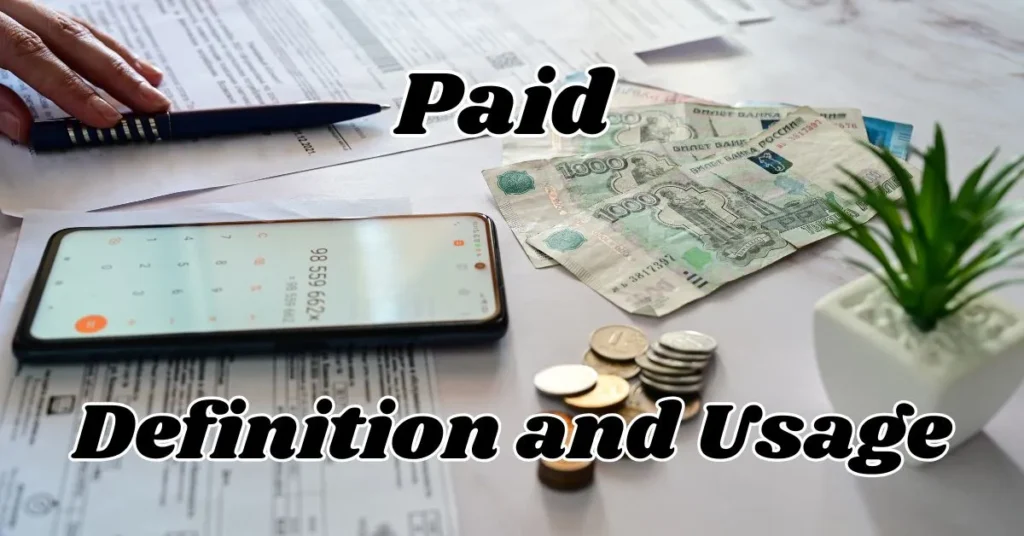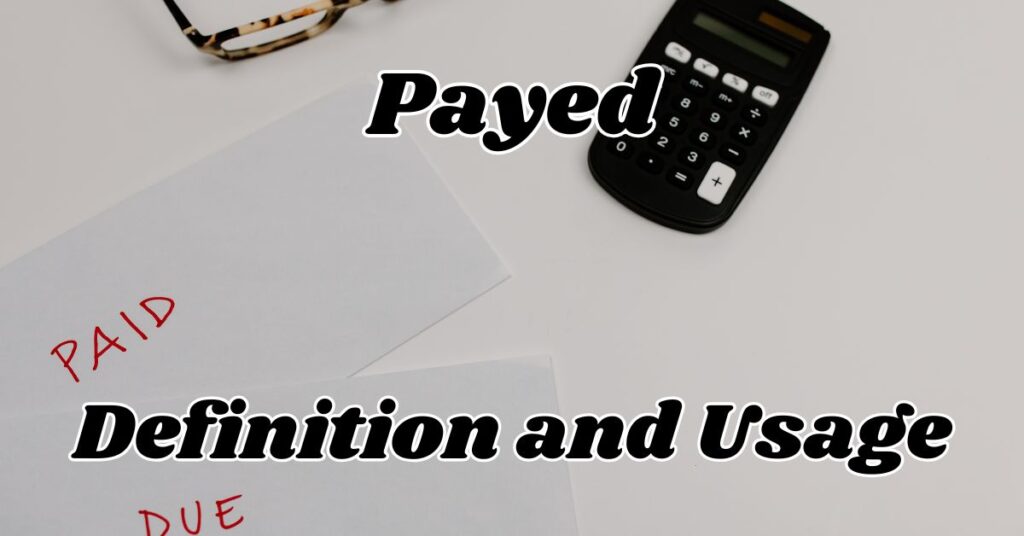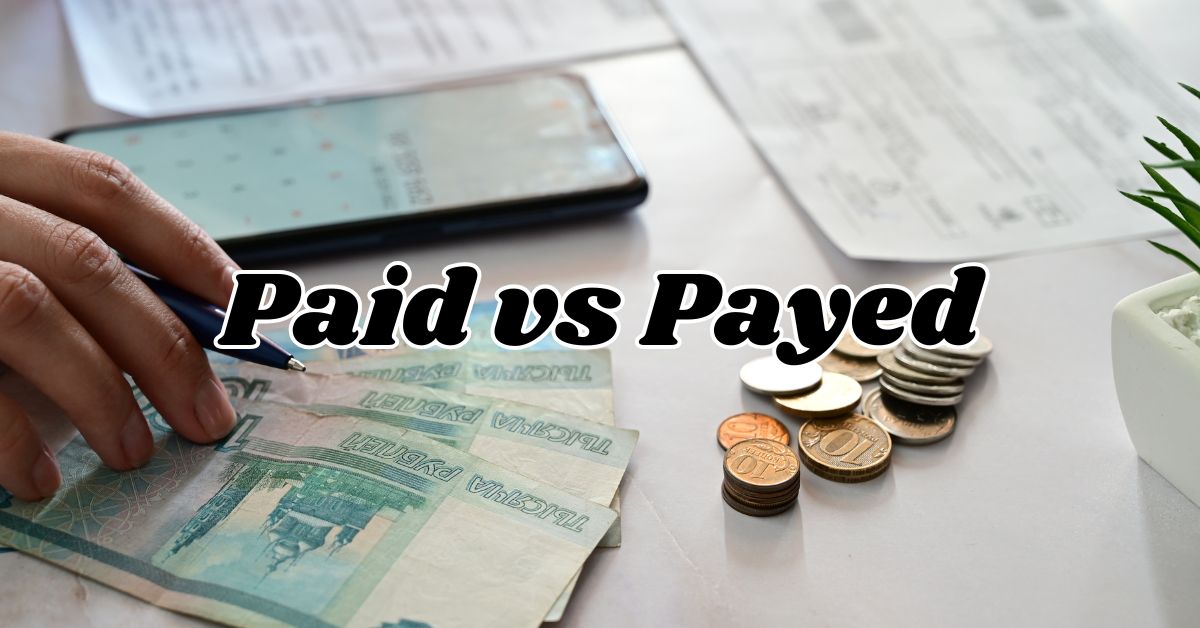Paid vs Payed these two words often confuse even experienced writers. Understanding their differences is crucial for correct grammar. Paid is the past tense and past participle of “pay” and is widely used in financial and figurative contexts, such as “paid for goods” or “paid attention.”
On the other hand, payed is a specialized nautical term, used when referring to sealing a deck or letting out rope, as in “payed out.” While paid is far more common, knowing when to use payed can enhance your writing precision.
This guide will help you master these terms, avoid mistakes, and improve your overall language skills with expert writing tips.
Understanding Paid vs Payed
The confusion surrounding paid or payed stems from the fact that both words look and sound similar, yet they have distinct uses. The key takeaway is that “paid” is the generally accepted past tense and past participle of the verb “pay.”
Think of it like other irregular verbs, where the past tense isn’t formed by simply adding “-ed.” Just as we say “run” (present) and “ran” (past), we say “pay” (present) and “paid” (past). We will also cover the less common usage of “payed” in nautical contexts.
Exploring the Term ‘Payed’
While “paid” reigns supreme in most situations, “payed” does have a specific, albeit less common, usage. You’ll primarily encounter “payed” in nautical contexts when referring to the act of “paying out” rope or cable. Imagine sailors carefully “payed out” the anchor rope.
This seafaring term is quite specialized, and you’re unlikely to encounter it in everyday conversation or writing. Think of it as a grammar mistake waiting to happen if used outside of its specific context.
Origins of the Word Paid
Originating around 1200, “pay” stems from Old French “paier” and ultimately Latin “pacare,” meaning “to please” or “make peaceful.” Initially used to signify appeasement, by the 13th century, it evolved to mean giving due compensation.
The sense of pleasing faded by 1500, while figurative uses like enduring punishment emerged. Later, “pay” extended to rendering without obligation (e.g., paying attention) and, by the 19th century, to denoting profitability.
Paid: Definition and Usage

As the past tense and past participle of “pay,” “paid” signifies the completion of an action involving payment. Whether you’ve paid for groceries, paid bills, or paid attention in class, “paid” is the word you need.
It’s a versatile word that appears in countless contexts related to payment, transactions, and even metaphorical “payments” like paying attention.
Paid Meanings
The word “paid” carries a variety of meanings, all related to the idea of fulfilling an obligation or completing a transaction. It can refer to paying money, paying attention, or even paying a visit. The specific meaning depends on the context in which it’s used.
Delving into the Term ‘Paid’
Let’s delve deeper into the usage of “paid.” Consider the phrase “paid in full.” This signifies that a transaction has been completed, and the debt has been settled. Similarly, “paid attention” implies that someone has given their focus and consideration to something.
These examples highlight the diverse ways in which “paid” functions in the English language.
Paid Usage
Grammatically, “paid” functions as both the past tense and past participle of “pay.” This means it can be used to describe actions that have already happened (past tense) or to indicate a completed action (past participle).
For example, “I paid the bill yesterday” (past tense) and “The bill has been paid” (past participle).
Example Sentences Using “Paid”
- She paid for her coffee.
- He paid his respects to the deceased.
- They paid a hefty price for their mistake.
- We paid close attention to the speaker.
- I paid the plumber for his services.
Synonyms of Paid
- Compensated
- Reimbursed
- Remunerated
- Settled
- Discharged
- Cleared
- Defrayed
- Liquidated
- Satisfied
- Requited
Payed: Definition and Usage

“Payed” primarily functions in nautical contexts, denoting the act of releasing or extending rope, cable, or chain. Think of sailors carefully “paying out” the anchor line. This specialized usage distinguishes it from “paid,” the standard past tense of “pay.”
While rarely encountered elsewhere, understanding “payed” is crucial for comprehending maritime literature and terminology. Its meaning is rooted in the practicalities of seafaring.
Payed Meanings
Within its nautical domain, “payed” specifically describes the controlled dispensing of rope or cable. It implies a deliberate and often gradual action, essential for tasks like anchoring, mooring, or managing sails.
The term evokes images of sailors working in unison, ensuring the smooth and safe deployment of lines. This precise meaning highlights its connection to maritime practices.
Payed Usage
“Payed” is used as a verb in nautical settings. For instance, one might say, “The crew payed out the mooring lines.” This usage emphasizes the action of extending or releasing the rope.
It’s vital to remember that this is the sole legitimate context for “payed.” Using it outside of this specific maritime sense constitutes a grammatical error.
Example Sentences Using ‘‘Payed’’
- The captain ordered the crew to payed out the anchor.
- They carefully payed the line to avoid any snags.
- The sailors payed out more rope during the storm.
- She payed the hawser with practiced skill.
- He payed the cable slowly and steadily.
Side by Side Comparison Paid or Payed
| Word | Usage | Example |
| Paid | General past tense and past participle of “pay” | I paid for the groceries. |
| Payed | Nautical context, “paying out” rope or cable | The sailor payed out the anchor rope. |
Phrases That Use Payed and Paid
“Paid” appears in numerous common phrases, enriching the English language. Think of expressions like “paid in full,” signifying complete payment; “paid attention,” denoting focused concentration; or “paid the price,” implying consequences.
These phrases demonstrate the versatility of “paid” beyond simple transactions. Conversely, “payed” rarely features in common phrases outside its nautical use, highlighting its specialized nature. The prevalence of “paid” in everyday language reinforces its status as the standard past tense of “pay.”
Check commonly confused words
English abounds with words that sound or look similar but have distinct meanings, creating ample opportunity for confusion. Besides “paid” and “payed,” consider “affect” and “effect,” “their,” “there,” and “they’re,” or “to,” “too,” and “two.”
Understanding the nuances of these word pairs is crucial for clear communication. Consulting a dictionary or grammar guide can help distinguish between them, improving writing accuracy and preventing common errors.
Paid Attention vs Payed Attention
The correct phrase is always “paid attention,” never “payed attention.” This common error highlights the importance of remembering that “paid” is the standard past tense of “pay.” “Payed attention” is a mistake, even though it might seem logical to some.
Consistently using “paid attention” reinforces correct grammar and avoids a frequent pitfall. This distinction is a key element in mastering the proper usage of “paid” and “payed.”
Payed Off or Paid Off

The phrasal verb is “paid off,” not “payed off.” “Paid off” has several meanings, including yielding positive results (“My hard work paid off”) and settling a debt (“I paid off my loan”).
“Payed off” is incorrect in all these contexts. Remembering this distinction is essential for using the phrasal verb correctly and avoiding a common grammar mistake. “Paid off” is the established and accepted form.
Common Mistakes and How to Avoid Them
The most common mistake is using “payed” when you should use “paid.” Remember that “paid” is the standard past tense and past participle of “pay” in almost all situations.
Only use “payed” when referring to the nautical term of paying out rope. Using a grammar checker tool can also be helpful.
Tips from Native English Editors
Native speakers and language editors often recommend creating memory aids to distinguish between “paid” and “payed.” One helpful trick is to associate “payed” with the sea, as its usage is primarily nautical. Reading examples of correct usage can also improve your language skills. Practice is key.
More Article: Plural of Monday: Is it Monday or Mondays
FAQ’s: Paid vs Payed
Is it Paid vs Payed?
It’s generally “paid” for most uses. “Payed” is only correct in nautical contexts, like “payed out the rope.”
Is it “paid” or “payed” money?
It’s always “paid money.” “Payed” is never used with “money.”
Is it fully paid or fully payed?
It’s “fully paid.” “Fully payed” is incorrect in this context.
Why do people use payed?
People likely use “payed” due to confusion with regular verbs ending in “-ed,” or from limited exposure to its nautical usage.
Conclusion
Mastering the distinction between paid vs payed enhances clarity and precision in writing. Remember that paid serves as the standard past tense and past participle of “pay” in nearly all situations, from financial transactions to metaphorical expressions like “paid attention.”
Payed finds its place solely within nautical contexts, describing the act of releasing rope or cable. By understanding this key difference, you can confidently choose the correct word, avoiding common grammar mistakes and elevating your language skills.
Consistent practice and attention to context are crucial for solidifying this knowledge and ensuring accurate usage of paid and payed in your writing.
Related Post: Coach vs Couch: What’s the Difference?

